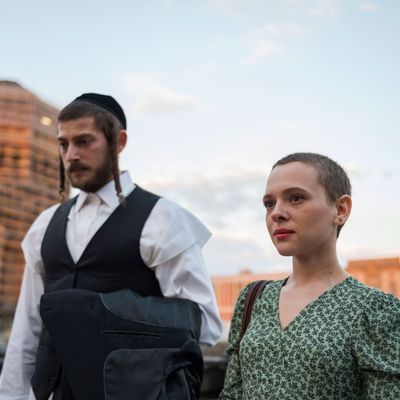
Thanks to the COVID-19 shutdown, we are all desperate to feel like we’re somewhere other than on our own couches. We want to be transported, to feel like we’re encountering new people, as opposed to no one other than our pets and houseplants.
The new Netflix series Unorthodox is able to work that much-needed magic. In broader, thematic terms, the four-episode series, about a woman attempting to break free of a life that constrains her, feels right for this moment. Unorthodox also introduces its audience, in immersive detail, to Satmar Hasidic Jewish culture and to a community of conservatory students in contemporary Berlin. It’s a journey in every sense, and the first series that I’ve been able to binge-watch in a rush, without taking extended pauses to mainline more news, since the pandemic began.
Israeli actor Shira Haas plays Esther, or Esty, a young woman who, in the opening moments of the first episode, is attempting to flee her Satmar Hasidic community in the Williamsburg section of Brooklyn without anyone noticing, especially her husband Yanky (Amit Rahav). It’s unclear at first why she needs to run and why she decides to go to Berlin, but those initial scenes are still palpably tense. Esty is clearly desperate to get away, and when you see someone trying to run, your instinct is to root for them to get where they’re going.
Unorthodox focuses simultaneously on where Esty lands — in Berlin, where she meets Robert (Aaron Altaras) and his musician friends — and what has brought her to the point where she felt compelled to escape Brooklyn, toggling between flashbacks and moments from her present. Information about Esty’s background leaks out little by little, with creators Anna Winger and Alexa Karolinski, who adapted the series from Deborah Feldman’s memoir, parceling out the details about how her arranged marriage came to be and why her grandmother and aunt raised her. That approach is one of the things that makes Unorthodox — which is both a character study and, once Yanky and his dodgy cousin Moishe (Jeff Wilbusch) try to track Etsy down in Germany, a pseudo-thriller — so arresting.
Filmmaker and longtime German actress Maria Schrader also does a beautiful job of directing, capturing rituals and hyperspecific details — the furry, tall shtreimels worn by the Hassidic men, the veiling of Etsy’s face during the Bedeken ceremony prior to her wedding — with the eye of a documentarian. Veils, curtains, glass doors, and windows make regular appearances, metaphors for the barrier that exists between the Hasidic community and the non-Hasidic Brooklyn that bustles around it, visible but beyond reach. Schrader also makes the most of close-ups on her leading lady’s face, zooming in to capture moments of anguish both restrained and released.
And what an expressive face that is. Haas gives an extraordinary performance here, evoking fear, grief, and a mix of both naïveté and wonder at what she discovers in Berlin. Having lived in an extremely insular culture, she experiences for the first time things that are ordinary to most 19-year-olds, like search engines and couples openly kissing in public. “I’ve never seen anything like this before,” she says, awestruck, when she walks into an EDM concert. With her petite frame and eyes as wide as a girl in a Margaret Keane painting, Haas is naturally convincing as someone simultaneously young for her years and older than them because of the struggles she’s had to endure.
Without giving too much away, the Satmar Hasidic community, with its antiquated ideas about gender roles and sex, has an air of Gilead about it. But to its great credit, Unorthodox is blunt in its depiction of how poorly women are treated within this particular religious framework while still remaining respectful of the religion itself, including its lovelier traditions, like the mikvah, the traditional bath that Hasidic women take before marriage.
Water is a recurring motif in Unorthodox. In addition to the mikvah scene, Esty experiences a different sort of cleansing that when she walks into a lake in Germany and immerses herself, fully clothed, within it. Even the tears that well up the first time she watches an orchestra performance are so thick that they make her eyes look like pools just starting to fill. Esty is undergoing an incremental rebirth after being shut away from the wider world for a very long time. Right now, in particular, it is a gratifying, beautiful thing to witness.


